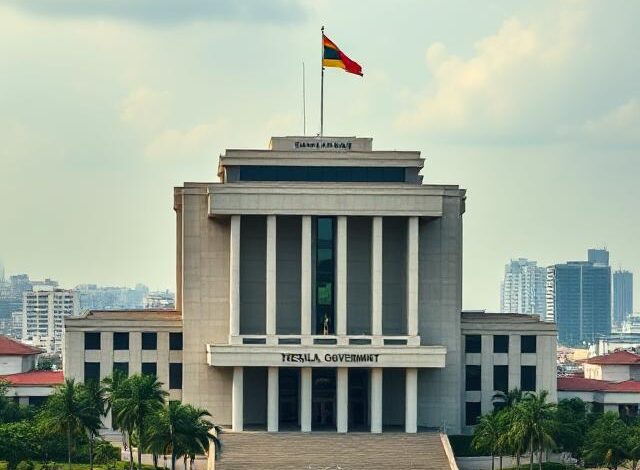
On August 12th, Sri Lanka’s Parliamentary Committee on Public Finance (CoPF) approved the draft legislation to establish the Gambling Regulatory Authority (GRA). The meeting was chaired temporarily by opposition Member of Parliament Rauff Hakeem, who stepped in for the usual chair, Harsha de Silva, who was abroad. Sri Lanka gambling regulation
This legislative development marks a significant move towards modernizing Sri Lanka’s gambling sector by creating an autonomous body responsible for overseeing all gambling activities, including casinos and online platforms. The primary aims of the proposed authority are to regulate the industry effectively, protect consumers, ensure transparency and fairness, and foster tourism and economic growth.
The bill envisions the GRA as a comprehensive oversight body tasked with licensing operators, enforcing responsible gambling practices, combating money laundering, and maintaining safety, hygiene, and service standards at gambling venues. It also seeks to support the tourism sector and stimulate economic activity. To achieve these objectives, the legislation proposes repealing outdated laws such as the Horse Racing Betting Ordinance, the Gambling Ordinance, and the Casino Ordinance. The proposed board of the GRA would include senior officials like the Secretary to the Ministry of Finance, the Commissioner General of the Inland Revenue Department, the Head of the Financial Intelligence Unit, and the Inspector General of Police or their representatives. Additionally, three members appointed by the Finance Minister would serve three-year terms, ensuring a mix of expertise and oversight.
The initiative to establish a dedicated Gambling Regulatory Authority was first proposed by CoPF in November 2022. However, progress has been slow due to political disagreements and bureaucratic delays. Currently, Sri Lanka’s casino industry operates under a fragmented legal framework, primarily governed by the Casino Business (Regulation) Act of 2010 and the Betting and Gaming Levy Act of 1988. These laws lack comprehensive regulations for licensing and zoning, which has led to irregularities and uncertainty. Notably, several major casinos, including Bally’s, Bellagio, Casino Marina, and Stardust, continue to operate under provisional licenses granted in 2013. Critics, including CoPF, have expressed concern over the Ministry of Finance’s sluggish implementation of the new authority and its failure to align with international standards. Particular attention has been drawn to the 20-year licenses awarded to John Keells Holdings (JKH) and Melco Resorts & Entertainment for their City of Dreams resort, which opened on August 2, 2025.
Despite parliamentary approval, questions remain regarding the independence of the proposed regulator. Experts and think tanks, such as the Advocata Institute, have raised concerns about the level of control the draft legislation grants to political authorities. The bill authorizes the Minister of Finance to appoint the Director General and board members, issue binding directives, and make regulations. This concentration of power raises fears that the regulator could be subject to political interference, undermining its credibility and effectiveness. Advocata emphasized that a truly independent regulatory body is essential for maintaining public trust and ensuring effective oversight, and they argue that the current draft does not adequately establish such independence.
Further criticisms focus on gaps within the bill itself. Notably, online gambling—a rapidly expanding sector with significant risks—is not addressed in the legislation. The Sri Lanka Tourism Development Authority and state-run lottery agencies are also excluded from oversight under the proposed framework. Revenue collection remains largely reliant on self-reporting by operators, which experts argue is insufficient for effective compliance and enforcement. Sudaraka Ariyaratne, a research consultant at Advocata, pointed out that the Inland Revenue Department currently has limited capacity to verify reported incomes reliably. Additionally, penalties for violations, such as operating without a license, are considered inadequate compared to international standards, potentially enabling major operators to evade compliance.
The government’s stated goal with the new framework is to boost tourism, attract foreign investment, and increase tax revenues. Finance Minister and President Anura Kumara Dissanayake has positioned the bill as part of Sri Lanka’s broader strategy to recover from the economic downturn experienced in 2022. Measures included in the 2025 budget reflect this aim, such as doubling the casino entry fee from $50 to $100 and increasing taxes on gambling revenues from 15% to 18%. These steps are intended to modernize the industry, strengthen regulatory oversight, and foster greater public confidence.
Regionally, Sri Lanka’s gaming market, valued at approximately $294 million in 2020, is forecasted to grow to over $410 million by 2026. With the South Asian gaming industry expected to surpass $7.5 billion by 2028, establishing a clear and effective regulatory environment is crucial for attracting investment and remaining competitive. Advocata has cautioned that other countries, like the UAE and Thailand, are moving swiftly to open their gambling sectors, and Sri Lanka risks falling behind if it does not act decisively. The think tank warned that delays and regulatory ambiguity could result in lost opportunities for tourism and investment to regional competitors. Sri Lanka gambling regulation
Read also: Light & Wonder Unveils New Slot Games and Casino Solutions at AGE Sydney 2025
Looking ahead, once the bill receives final approval from Parliament, industry experts suggest that amendments are necessary to ensure the regulator’s independence, extend oversight to online gambling, and improve revenue tracking mechanisms. Advocata has advocated for revisions that would establish a transparent, autonomous, and credible regulatory body—essential for fostering sustainable growth, attracting investments, and safeguarding public interests. The passage of this legislation could ultimately lead to the creation of a unified framework covering casinos, online gambling, and lotteries, positioning Sri Lanka as a more competitive player within the regional gaming landscape.
Finally, Colombo is poised to become a hub for South Asia’s gaming industry. The upcoming SiGMA South Asia summit, scheduled from November 30 to December 2, 2025, promises an opportunity for industry leaders, investors, and regulators to network, explore new markets, and shape the future of gaming in the region. Sri Lanka gambling regulation









